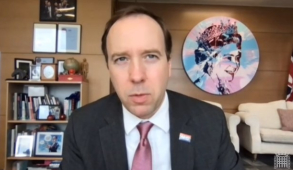Further assurances given on 2021/22 Covid funding
NHS Providers last week claimed that without confirmation of budgets, the NHS would have to start planning cuts of up to £7bn - £8bn for the first half of the new financial year. During an evidence session as part of the Commons committee’s inquiry into the government’s white paper on integration, committee chair Jeremy Hunt asked the health secretary why the budget confirmation was taking so long.
Mr Hancock (pictured) insisted the position was clear. The NHS underlying budget had been agreed as part of the NHS long-term plan settlement and last year’s spending review had added a further £3bn to the pot. This includes £1bn to begin tackling the backlog of planned care, £500m to improve access to mental health services and £1.5bn to ease existing financial pressures. And the direct operational costs of Covid would also be funded.
‘Working out exactly what they are is complicated,’ he said, ‘not least because we have to see where we are in the pandemic. But for anybody running a trust or system the message is very clear that we will cover the operational costs of Covid.’
Last week NHS England chief executive Simon Stevens said there was an ‘expectation’ of additional funding for unavoidable Covid costs. However, NHS leaders want these assurances turned into a firm budget.
The NHS Confederation this week published a letter to the chancellor calling for NHS funding to be finalised urgently. ‘We understand the impact the pandemic has had on public finances and the uncertainty this has caused,’ said Confederation chief executive Danny Mortimer. ‘But it is simply not possible for the NHS to fully recover services, while still dealing with the pandemic, unless there is an agreed budget for next year. NHS leaders are struggling to comprehend why they are in this position and they desperately require certainty.’
The confederation was concerned that a promise to give the NHS ‘whatever resources’ it needed to respond to Covid-19 hadn’t translated into a finalised budget with just a couple of weeks remaining before the new financial year. ‘NHS organisations cannot be expected to absorb these ongoing costs in their current budgets,’ Mr Mortimer added.
The organisation has also underlined the importance of access to capital funding for new equipment and to enable changes to buildings and infrastructure. Wards, GP surgeries, ambulance call centres and other healthcare settings all need to be remodelled to respond to the ongoing demands for infection control, the letter said.
The Commons committee also quizzed Mr Hancock about plans to assess integrated care system (ICS) performance in the restructured NHS envisaged by the integration white paper. The health secretary said that the stronger accountability targeted by the white paper could only be delivered if there was also high-quality analysis and public understanding of how well each system is doing.
‘We will ensure as part of the bill that the Care Quality Commission will be able to inspect how well systems are doing and publish on that basis,’ he said. He added that the existing high level, four-part reports for NHS providers – rating services as ‘outstanding’, ‘good’, ‘requires improvement’ or ‘inadequate’ – were well understood. In a letter to the committee, the health secretary said that ‘oversight mechanisms will include a summary rating for ICSs and will be underpinned by full data sharing’.
Related content
We are excited to bring you a fun packed Eastern Branch Conference in 2025 over three days.
This event is for those that will benefit from an overview of costing in the NHS or those new to costing and will cover why we cost and the processes.